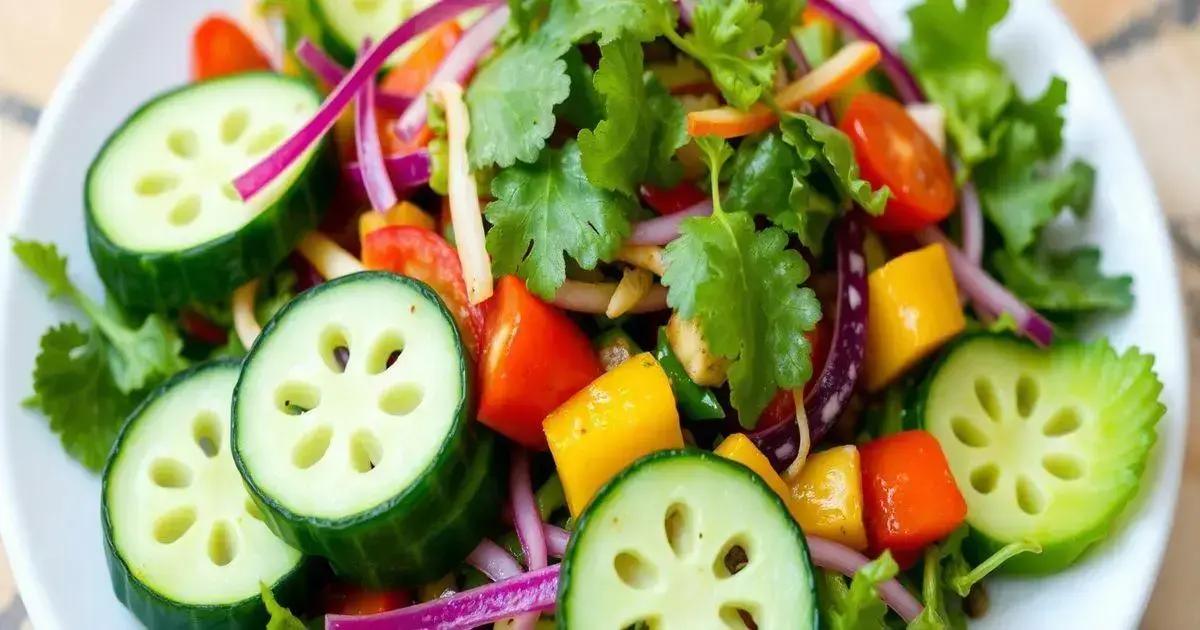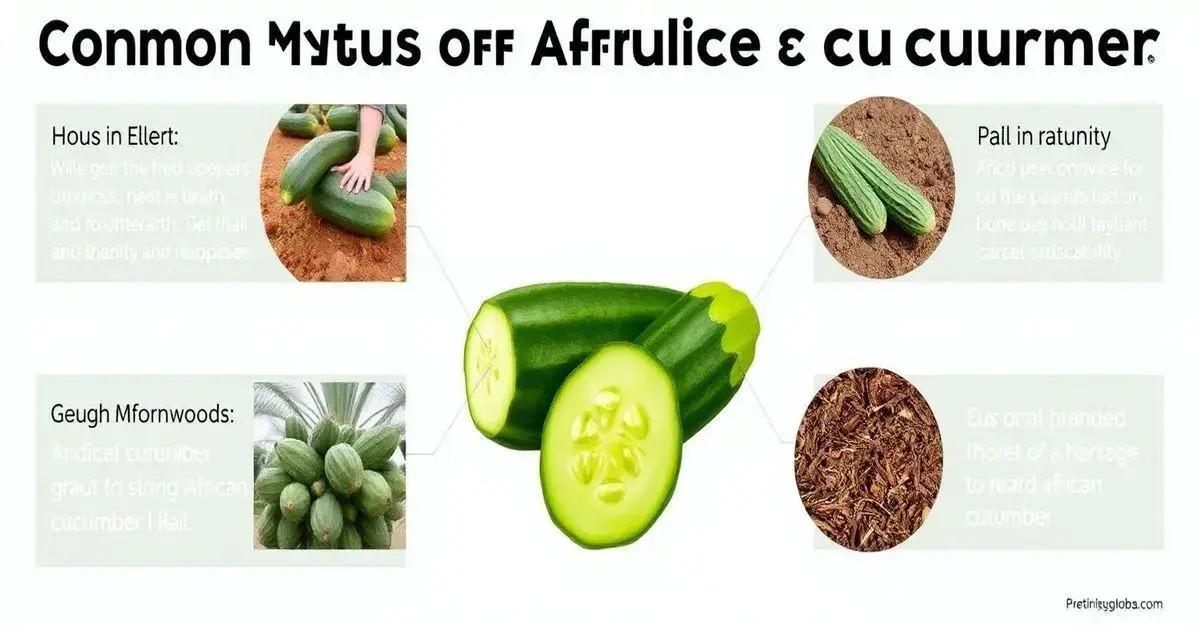The African cucumber, also known as Kiwano, is a nutritious fruit low in calories and high in water content. It is safe to eat, offers various culinary uses like salads and smoothies, and is rich in vitamins and minerals, debunking myths about its edibility and health benefits.
The African cucumber, often referred to as the Kiwano, is a fascinating fruit with a unique appearance and flavor. Known for its spiky yellow-orange skin and green, jelly-like flesh, the African cucumber is not just a visual delight but is also rich in nutrients. In this article, we will uncover the truth about the African cucumber – is it a mere myth or a reality packed with culinary potential? Join us as we explore its benefits, uses, and the myths that surround this exotic fruit.
What is the African Cucumber?

The African cucumber, also known as Kiwano, is a unique fruit that originates from Africa. This fascinating plant can be identified by its spiky yellow-orange skin and bright green, jelly-like flesh. It belongs to the Cucurbitaceae family, which also includes cucumbers, melons, and pumpkins.
Typically, the African cucumber grows on vines that thrive in warm climates. The fruit’s shape resembles a horned melon or a spiky, colorful peach. Its taste is often described as a combination of cucumber, banana, and kiwi, offering a refreshing flavor that is sure to surprise anyone who tries it.
Where is it Grown?
Primarily, the African cucumber is cultivated in regions of southern and eastern Africa. However, it has gained popularity worldwide and is now grown in many parts of the globe, including the United States and New Zealand. Its resilience to drought conditions makes it an attractive crop for arid regions.
How is it Used?
The African cucumber can be eaten raw, sliced into salads, or blended into smoothies. Its high water content makes it an excellent hydrating snack. This fruit is not only tasty but also adds a tropical flair to various dishes.
In summary, the African cucumber is more than just a pretty fruit; it’s a versatile and nutritious food option that is worth exploring in both culinary and nutritional contexts.
Nutritional Benefits of African Cucumber

The African cucumber is not just a tasty fruit; it is also packed with numerous nutritional benefits. This exotic fruit is low in calories, making it an ideal snack for those watching their weight. It contains approximately 44 calories per 100 grams, which is quite low compared to other fruits.
One of the standout features of the African cucumber is its remarkable water content. With about 90% water, it serves as a great hydrating option, especially in hot weather. This high water content helps to keep the body hydrated and supports overall health.
Vitamins and Minerals
In terms of vitamins, the African cucumber is a good source of Vitamin C, which plays an essential role in boosting the immune system and promoting skin health. Additionally, it contains Vitamin A, which supports vision and contributes to healthy skin.
The fruit also provides important minerals such as potassium and magnesium. Potassium helps regulate blood pressure, while magnesium is essential for muscle function and energy production.
Dietary Fiber
Another significant benefit of the African cucumber is its d dietary fiber content. Fiber is crucial for digestive health as it aids in maintaining a healthy gut and helps prevent constipation. Consuming fiber-rich fruits like the African cucumber can promote a feeling of fullness and help regulate appetite.
In summary, incorporating the African cucumber into your diet not only adds a unique flavor but also offers a wealth of nutritional advantages that contribute to a healthier lifestyle.
Culinary Uses and Recipes

The African cucumber is a versatile ingredient in the kitchen. Its refreshing taste makes it perfect for various dishes. Here are some culinary uses and delicious recipes that highlight this unique fruit:
Fresh Salads
One of the easiest ways to enjoy African cucumber is by adding it to salads. Simply slice it and combine with greens, nuts, and a light dressing. Its crunchy texture adds a fun twist.
Smoothies
For a hydrating smoothie, blend African cucumber with banana, spinach, and yogurt. This combination creates a delicious, creamy drink that is great for breakfast or a snack.
Salsa
Create a refreshing salsa by mixing diced African cucumber with tomatoes, onions, lime juice, and cilantro. This can be served with tortilla chips or as a topping for grilled chicken or fish.
Stuffed African Cucumber
For a unique twist, try stuffing African cucumber with a mixture of quinoa, black beans, corn, and spices. Bake until warm for a nutritious and filling dish.
These are just a few ways to incorporate African cucumber into your meals. Its versatility and unique flavor can elevate any dish!
Debunking Myths About African Cucumber

There are many myths surrounding the African cucumber that can lead to confusion. Let’s debunk some of the most common misconceptions:
Myth 1: It’s Poisonous
One of the biggest myths is that African cucumber is poisonous. In reality, the fruit is perfectly safe to eat. The confusion may arise from its unusual appearance, which can make it seem unappetizing.
Myth 2: African Cucumber Has No Nutritional Value
Another common belief is that the African cucumber lacks nutritional benefits. This is false. The fruit is low in calories and rich in vitamins, minerals, and hydration, making it a healthy addition to any diet.
Myth 3: It Can Only Be Used in Exotic Dishes
Some think that African cucumber can only fit into exotic recipes. However, this fruit can be easily incorporated into everyday meals, such as salads, smoothies, and salsas.
Myth 4: African Cucumber Should Be Eaten Only Ripe
Many believe that African cucumber must be fully ripe to be consumed. While ripe fruit is delicious, younger cucumbers are also edible and provide a crunchier texture.
By clearing up these myths, you can appreciate the African cucumber for its culinary versatility and health benefits.
Embracing the Unique Benefits of the African Cucumber
The African cucumber stands out not just for its striking appearance, but also for its numerous health benefits and culinary versatility. As we explored, this exotic fruit is low in calories, high in hydration, and rich in essential nutrients.
With an array of culinary uses, from fresh salads and smoothies to unique stuffed dishes, the African cucumber offers a refreshing twist to daily meals. By debunking myths surrounding this fruit, we can see it for what it truly is: a nutritious addition to any diet.
Embracing the African cucumber allows us to enjoy its delightful flavor while reaping the health rewards it has to offer. So, the next time you come across this vibrant fruit, go ahead and give it a try!
FAQ – Frequently Asked Questions about African Cucumber
What is an African cucumber?
The African cucumber, also known as Kiwano, is a unique fruit with spiky yellow-orange skin and green, jelly-like flesh, native to Africa.
What are the nutritional benefits of African cucumber?
African cucumber is low in calories, high in water content, and rich in vitamins such as Vitamin C and minerals like potassium and magnesium.
How can I use African cucumber in my meals?
African cucumber can be added to salads, smoothies, salsas, or even stuffed with various fillings for a unique dish.
Is African cucumber safe to eat?
Yes, African cucumber is completely safe to eat and is enjoyed in various culinary applications.
What are some myths about African cucumber?
Common myths include that it is poisonous, has no nutritional value, can only be used in exotic dishes, and must be fully ripe to eat.
Can African cucumber be eaten raw?
Absolutely! African cucumber can be eaten raw and is often enjoyed for its refreshing taste and crunchy texture.













